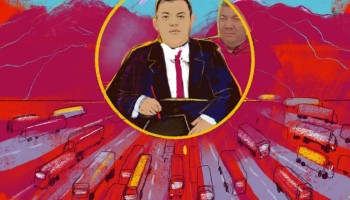At the heart of this investigation is Khabibula Abdukadyr, his family, and their emergence as wealthy, politically-connected investors across Central Asia and beyond.
They have been welcomed with enthusiasm by the region’s leaders: Uzbekistan’s President Shavkhat Mirziyoyev publicly toured one of their construction sites in the heart of his country’s capital, and Kyrgyzstan’s President Sadyr Japarov told reporters that he greeted their investments “with applause.”
This alone wouldn’t be noteworthy — except for what’s been revealed about the family in the past.
To help make sense of this complex story and provide additional context, we’ve put together this list of questions and answers about the family and their doings.
1. Who is Khabibula Abdukadyr and his family?
The Abdukadyr family are ethnic Uighurs of Chinese origin. They hold citizenship in multiple countries and have homes in Almaty, London, Dubai, and a suburb of Washington DC.
The leader of the family is Khabibula Abdukadyr, the eldest of four brothers. He featured prominently in previous investigations into allegations of bribery, smuggling, money laundering, and political patronage in Central Asia.
The family has built a network of companies around the world, which they use to make their investments. Various members of the family, including Abdukadyr’s brothers, several of their children, and other relatives, hold stakes in these companies in different combinations.
Abdukadyr’s immediate relatives use several last names, including Hadeer, Palvan, and Aibibula. For simplicity, the members of the family connected to their business network are referred to in this project as the Abdukadyrs because Khabibula Abdukadyr is the head of their empire.
2. What exactly did previous reporting find about the origins of the Abdukadyr family’s wealth?
The source of the Abdukadyrs’ wealth was exposed in 2019 after a self-confessed money launderer named Aierken Saimaiti — like them, a Uighur of Chinese origins — made contact with reporters.
Bearing armloads of documents, Saimaiti said that the family’s patriarch, Khabibula Abdukadyr, had hired him to spirit hundreds of millions of dollars into bank accounts across the world. He also described the origins of that money: An alleged smuggling empire that depended on collusion with corrupt customs officials to make enormous profits.
In Saimaiti’s telling, Abdukadyr made hundreds of millions of dollars trucking vast amounts of Chinese goods through Kyrgyzstan for sale in Uzbekistan and other countries. The business was so lucrative, he said, because Abdukadyr had made an alliance with a senior Kyrgyz customs official. Corroborating Saimaiti’s records with other sources, reporters found that this official essentially placed his agency at Abdukadyr’s disposal in exchange for monetary bribes, ensuring that his trucks sailed through checkpoints while competitors faced obstacles and delays.
These findings were detailed in a 2019 investigation by RFE/RL's Radio Azattyk, OCCRP, and its Kyrgyz member center, Kloop, “Plunder and Patronage in the Heart of Central Asia.” Its publication caused street protests and widespread outrage in Kyrgyzstan. A subsequent investigation, “The Matraimov Kingdom,” focused on Raimbek Matraimov, the customs official who allied with the Abdukadyr family.
Khabibula Abdukadyr has not been formally charged with any crimes related to Saimaiti's allegations. He has not previously answered reporters' questions. In response to questions sent as part of this investigation, reporters received an answer from a family email address saying an answer could only be provided at a later date.
3. What corroboration is there of allegations that Khabibula Abdukadyr ran a massive illicit smuggling operation and bribed customs officials?
Abdukadyr’s self-confessed money launderer, Aierken Saimaiti, provided a detailed description of the operation that was corroborated by a number of other sources, including former and current customs officers, a former minister, several members of parliament, as well as truck drivers, customs brokers, importers, and logistics specialists. These sources also corroborated the involvement of Khabibula Abdukadyr or companies owned by his family.
Neither Abdukadyr nor any member of his family responded to reporters’ questions or publicly denied these allegations.
After publication, Abdukadyr’s ally within the Kyrgyz customs service, Raimbek Matraimov, pleaded guilty to corruption, pled guilty to a “scheme … to receive remuneration for speeding up the customs clearance” of trucks traveling from China to Uzbekistan and Tajikistan.
While the verdict does not name Abdukadyr as a beneficiary of this scheme, it does cite details — such as a specific customs post and a time-frame — that corroborates the specifics of earlier reporting.
In December 2020, Matraimov was sanctioned by the United States. The sanctions notice does not name Abdukadyr, but describes Matraimov’s participation in an alleged smuggling scheme that matches earlier reporting.
4. Have any Abdukadyr companies ever been caught smuggling?
There have been only a few known instances over the years when customs officials in the region have flagged cargo carried by Abdukadyr family companies:
On five known occasions, Chinese customs officials fined Xinjiang Abu Sahiy Import and Export Trade Co., an Abdukadyr company, for carrying undeclared or counterfeit goods.
In 2016, a Kazakh court ruled that a Chinese company owned by the family supplied improper paperwork for cargo heading from China to Uzbekistan.
These isolated enforcement actions do not amount to criminal investigations and are not known to have led to any charges.
5. What corroboration is there of the claims that the Abdukadyrs’ money was laundered abroad?
When Saimaiti, Khabibula Abdukadyr’s self-confessed money launderer, came forward to reporters, he handed over a large collection of records related to the money he said he sent on his employer’s behalf. This included personal notes, spreadsheets, and fake contracts he used to justify his transfers, but also a collection of original wire transfer records, bank statements, and payment slips.
Reporters verified the authenticity of these records, which account for about half of the total amount of money Saimaiti said he sent. They were also corroborated by several independent sources:
A subpoena obtained by Radio Free Europe/Radio Liberty gave access to banking records that confirmed many of the same transfers that appeared in Saimaiti’s records.
Five “Suspicious Activity Reports,” filed to the U.S. Treasury and obtained by the International Consortium of Investigative Journalists, detail dozens of Saimaiti’s transfers and bank officers’ concerns about their legitimacy.
A Kyrgyz parliamentary commission, convened after the publication of the earlier investigation, confirmed that Saimaiti had transferred vast amounts of money out of the country — even more than reporters had found. The commission noted that Saimaiti had “worked with” Khabibula Abdukadyr, and that Abu Sahiy, a major Tashkent market that was the destination point of Abdukadyr’s alleged smuggling schemes, was the source of these funds.
6. Did anyone face any consequences after previous revelations?
After the initial investigative series was published, Kyrgyz citizens came onto the streets in protest, outraged at the involvement of the country’s powerful customs chief Raimbek Matraimov. After a political party curated by Matraimov won a close second place in a subsequent election, the results spurred mass protests that led to nullification of the results and a new government.
As noted above, Matraimov pled guilty to corruption and was sanctioned by the United States.
According to the Kyrgyz parliamentary commission, German investigators requested Kyrgyz authorities to provide information about a company owned by Saimaiti, suggesting that they were investigating his wire transfers to a German Abdukadyr company. Any results are not publicly known.
Khabibula Abdukadyr and his family are not known to have faced any official investigations or other consequences in Kyrgyzstan or elsewhere in Central Asia. In fact, as this project demonstrates, their footprint and stature as investors have only grown in subsequent years.
7. How do we know the Abdukadyr family is really behind all these investments?
Reporters spent over a year following the Abdukadyr family’s paper trail around the world. They found dozens of companies belonging to key members of the family and examined their assets using land records, government data, and other sources.
Unless noted otherwise in this project, all claims about company and asset ownership are based on these official sources.







